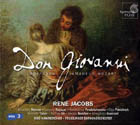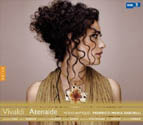 MOZART:
Don Giovanni -
harmonia mundi HMC 901964.66
MOZART:
Don Giovanni -
harmonia mundi HMC 901964.66
The centerpiece
of the Mozart/Da Ponte trilogy, Don Giovanni is considered
one of the finest operas ever written. This is serio-comic opera
at its best, and it is a mark of Mozart's genius that he could spin
the most beautiful music out of what today would be x-rated subjects
of sex (two rapes, or near rape and endless philandering) and violence
(one murder, and a beating to near-death!) and make of it a great
masterpiece of music and drama.
Once again, baroque and early music specialist René
Jacobs applies his unique "neo-classical"
approach to yet another "war horse" of the operatic repertoire
as he directs the RIAS Kammerchor and the Freiburger Barockorchester
playing on period instruments and an excellent cast (none of whom
are celebrity names as yet) who follow his dictum that in a recording,
singers "must act using only their voice" - to good effect,
all in the service of authenticity and great music-making.
Bravo, Maestro Jacobs! And bravo, Harmonia Mundi for raising the
bar by which "great recordings" are measured yet again.
CLICK TITLE BELOW to listen to a clip of Don Giovanni (sung by baritone
Johannes Weisser) serenading the peasant girl Zerlina.
 Canzonetta
Don Giovannii
(from
Act II, Scene III) - CD 2, Track 14
Canzonetta
Don Giovannii
(from
Act II, Scene III) - CD 2, Track 14
 More
Mozart operas >>>
More
Mozart operas >>>
 VIVALDI:
Atenaide -
naive RV 702-B VIVALDI:
Atenaide -
naive RV 702-B
The process of rediscovery goes on with this recording of another
Vivaldi rarity. Best known to contemporary music lovers as a prolific
composer of concertos, it is only in recent years that the 18th
century Venetian composer (who was also a priest) has been resurrected
as a prodigious composer of opera. Indeed, as more "lost operas"
are discovered, by both scholars and diligent opera singers themselves,
it will become common knowledge that the composer of the popular
"Four Seasons" devoted the greater part of his career
to opera, and received great acclaim for it.
Atenaide
is one "lost opera" that has seen the most recent
light of day. A Byzantine love story filled with intrigue
and betrayal born of secret desires, it nevertheless has a happy
ending. This recording is the first modern revival of the work,
but what makes it very special is the fact that it could be brought
back to life in the very theatre where it was premiered - the La
Pergola in Florence, the only Vivaldian opera house still standing
in virtually its original condition. Thus with the sacrosanct setting
in place, a recording of genuine historical fidelity to the original
work became a distinct and real possibility, and the only elements
needed were a cast of suitable voices complemented by an ensemble
of the musical instruments that Vivaldi so carefully specified in
the score, and a musical director to tie it all together. Obviously,
there requirements posed no significant barrier, and what we now
have is an outstanding recording with some of today's most exceptional
young singers and the 24-member Modo Antiquo under the masterful
direction of baroque specialist-flautist-musicologist-composer Federico
Maria Sardelli. Yes, so extraordinary, Vivaldi would turn, ever
so ecstatically, in his grave.
CLICK TITLE BELOW to listen to a clip of Teodosio (sung by mezzo-soprano
Vivica Genaux) waxing poetic
about his love for Eudossa (also known as Atenaide)
 Trovo
ne'gli occhi tuoi (from
Act I, Scene 7) - CD 1, Track 16
Trovo
ne'gli occhi tuoi (from
Act I, Scene 7) - CD 1, Track 16

 ERCOLE
SU'L TERMODONTE (DVD) -
Dynamic 33525
ERCOLE
SU'L TERMODONTE (DVD) -
Dynamic 33525
/ Il Complesso Barocco, Curtis (Spoleto Festival 2006) (2007)
Ercole is yet another "lost" Vivaldi opera rediscovered,
receiving its first revival in 280-some years at the 49th Spoleto
Festival (Italy) in the summer of 2006. This is a DVD of that
production, which is actually a reconstruction along Vivaldian principles
by musicologist, composer, and Vivaldi specialist Alessandro Ciccolini
from the scores of some thirty arias and two duets that had been
found in various archives, with Ciccolini composing the missing
parts, such as the recitatives.
The story is drawn from the legend in Greek mythology of the demi-god
Hercules as he attempts with the assistance of his adjutants led
by his friends, the heroes Theseus, Telamon and Alceste, to perform
the ninth of the twelve tasks or labors that must be accomplished
in atonement for his murder of his own children in a fit of wrathful
madness. In this version of the legend, the task consists in stealing
the arms of Antiope, Queen of the men-hating, warrior Amazons. But
the still wrathful Hercules prefers a bloodier adventure. Thus the
result is a grand battle of the sexes. In the end however,
love - having itself become the battlefield- reigns triumphant in
the hearts of all, including the now appeased and merciful Hercules.
The production boasts a proficient cast led by the American tenor
Zachary Stains as Hercules and Mary-Ellen Nesi as Antiope, most
all possessing the vocal agility and stamina needed to overcome
the hurdles omnipresent in Baroque opera, as ably supported by the
baroque ensemble Il Complesso Barocco conducted by Handel specialist
Alan Curtis. By stage director John Pascoe's account, the production
was attended by much commotion - perhaps partly because the rebirth
of a long lost opera is always cause for excitement, but perhaps
also because of his unusually original staging in which the opera's
underlying classical antiquity is presented in a way that is meant
to appeal to the modern sensibility, including that of the MTV generation.
The costumes are for the most part faithful to extant representations
of Greek mythological figures - in the case of most of the Amazons
- half-bare-breasted tunics, and for Hercules, but for the lion
skin cape draped over his back as depicted in every existing statue
of the demi-god - almost none at all. The stage is at all times
immersed in symbolism - from the long, leather boots of the Amazonian
leaders (symbolic of female empowerment), to the real olive trees
(representing peace), and to the bigger-than-life statuary of truncated
phalluses that dominate the stage in some scenes (obviously a reminder
that the action takes place in the land of the erstwhile men-haters).
The production succeeds musically and dramatically, but whether
its appeal is universal will probably depend on whether or not opera-goers,
especially in puritanical America, find the pervasive nudity and
phallic symbolism an excessive distraction from the beautiful music. Those
who are content enough to just listen can look forward to a Virgin
Classics recording of the opera scheduled in summer 2008 with Fabio
Biondi conducting the Europa Galante and a cast that includes mezzo-soprano
Vivica Genaux as Antiope. One
thing is clear, opera Vivaldi is in vogue. 
MORE
OPERAs >>
 DIETRICH
FISCHER-DIESKAU: Autumn Journey/ A Franz Schubert Recital
(DVD) -
Kultur D4207
DIETRICH
FISCHER-DIESKAU: Autumn Journey/ A Franz Schubert Recital
(DVD) -
Kultur D4207
There is no
better way for a music lover to learn about Lieder than
to journey through the life of one of the art form's greatest
masters, especially with the master himself showing the way. This
excellent DVD takes us through just that kind of journey.
This special
package is the first DVD release of a film made in 1995 on the
occasion of the great baritone's 70th birthday. It is essentially
a portrait of the artist set within the framework of a leisurely
conversation (in German with English subtitles) in which Fischer-Dieskau
takes the viewer through his life and times, illustrating the
highlights with photographs and extracts from films of his personal
and professional life. The focus of the film is Fischer-Dieskau
alone (not even the other party to the conversation is seen or
heard) and although something is surely lost in translation, the
viewer/listener comes away from over 3 hours of viewing time (on
one disc!) more knowledgeable not only about Lieder (having
also watched the bonus feature - a full-length recital of 23 songs
by Franz Schubert, accompanied by the pianist Hartmut Höll)
but also about opera, indeed of the sublime art we call music.

MORE
OPERAs >>
|